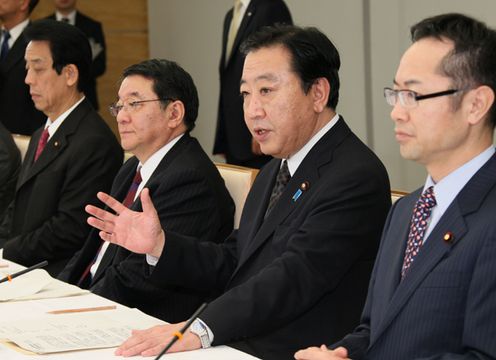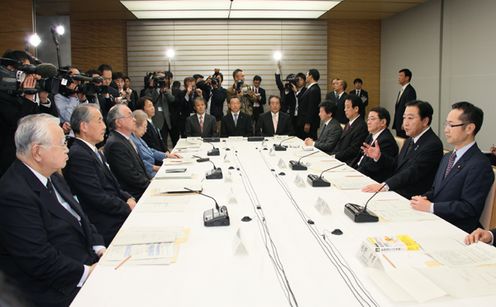Home > News > The Prime Minister in Action > November 2011 > The Council on National Strategy and Policy
The Council on National Strategy and Policy
Monday, November 21, 2011

Photograph of the Prime Minister delivering an address at the meeting of the Council on National Strategy and Policy 1

Photograph of the Prime Minister delivering an address at the meeting of the Council on National Strategy and Policy 2
Prime Minister Yoshihiko Noda held the second meeting of the Council on National Strategy and Policy at the Prime Minister's Office.
Discussion took place on the basic approach for the formulation of a basic strategy for the revival of Japan.
The Prime Minister said in his opening address, "Whether we decide a basic strategy for the revival of Japan, or consider a medium- and long-term national strategy going forward, I believe this cannot be done without looking at the European crisis the world is currently facing. The recent sovereign risk issue of Europe stems from fiscal problems of each country. As a precaution, I think it is important that we also steadily work on fiscal restructuring while promoting economic growth.
I want to also point out that this European crisis may possibly affect international trade in addition to spreading financial crisis, leading to the rise of protectionism. Unfortunately, the status of the WTO Doha Round negotiations involving nearly 200 countries and regions, although I won't call it hopeless, does not allow much optimism at this moment. Amidst this situation, various bilateral and multilateral agreements for high-level economic cooperation are being formed right now. Against the backdrop of the concern over the possible emergence of protectionism, we need to formulate a strategy with a resolve to promoting free trade.
Meanwhile, the discussion of a trilateral scheme among Japan, China, and the Republic of Korea (ROK) is accelerating. I proposed enthusiastically to Premier of the State Council of the People's Republic of China Wen Jiabao to finalize negotiations for an investment agreement. The joint research on a Japan-China-ROK free trade agreement (FTA) involving industrial, government, and academic sectors will be concluded within this year, and we are currently discussing about moving onto starting negotiations on the specifics from next year. At the same time, possibilities are emerging for ASEAN+3 and ASEAN+6 schemes. These kinds of things I believe must be surely incorporated into our national strategies.
One other thing I want to mention is the depth of the middle class, which has been a source of Japan's fundamental strength as a nation. I would like to discuss extensively how we can regain this depth through this venue in the context of opening up frontiers of a new Japan."

